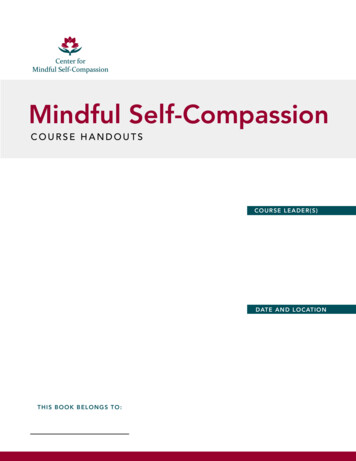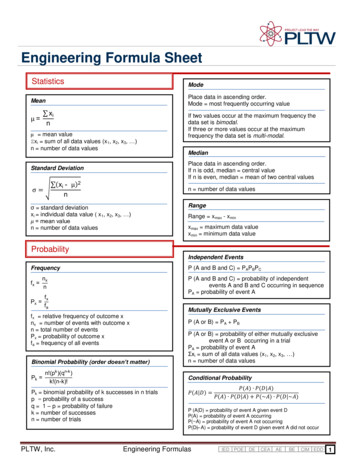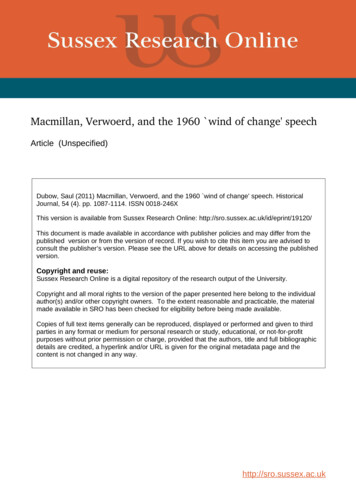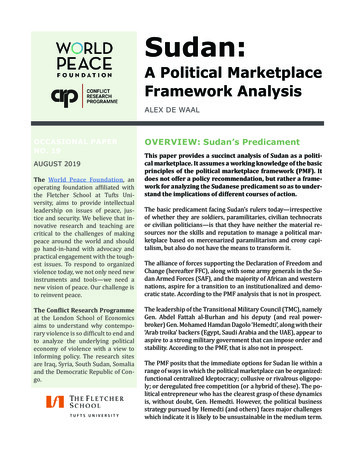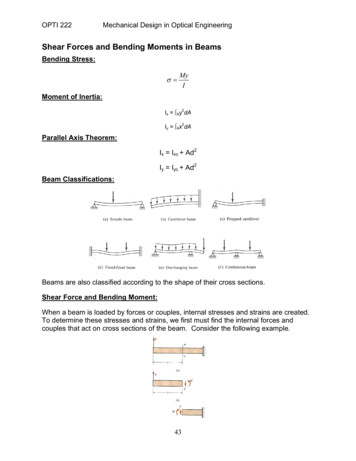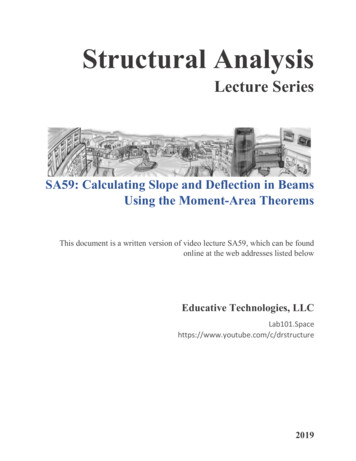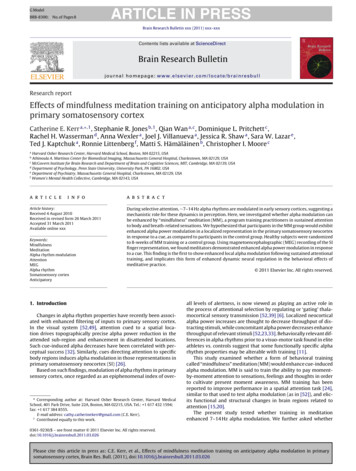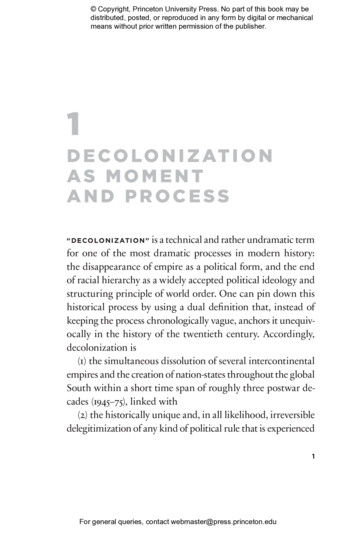
Transcription
Copyright, Princeton University Press. No part of this book may bedistributed, posted, or reproduced in any form by digital or mechanicalmeans without prior written permission of the publisher.1D E C O L O N I Z AT I O NAS MOMENTAND PROCESS“ DECOLON IZ ATION ” is a technical and rather undramatic termfor one of the most dramatic processes in modern history:the disappearance of empire as a political form, and the endof racial hierarchy as a widely accepted political ideology andstructuring principle of world order. One can pin down thishistorical process by using a dual definition that, instead ofkeeping the process chronologically vague, anchors it unequivocally in the history of the twentieth century. Accordingly,decolonization is(1) the simultaneous dissolution of several intercontinentalempires and the creation of nation- states throughout the globalSouth within a short time span of roughly three postwar decades (1945– 75), linked with(2) the historically unique and, in all likelihood, irreversibledelegitimization of any kind of political rule that is experienced1For general queries, contact webmaster@press.princeton.edu
Copyright, Princeton University Press. No part of this book may bedistributed, posted, or reproduced in any form by digital or mechanicalmeans without prior written permission of the publisher.2chapter 1as a relationship of subjugation to a power elite considered bya broad majority of the population as alien occupants.1Decolonization designates a specific world- historical moment, yet it also stands for a many- faceted process that playedout in each region and country shaking off colonial rule. Alternative attempts at a definition accentuate this second dimension. The historian and sinologist Prasenjit Duara, forexample, puts less emphasis on the breakdown of empires andmore on local power shifts in specific colonies when he defines decolonization as “the process whereby colonial powerstransferred institutional and legal control over their territories and dependencies to indigenously based, formally sov ereign, nation- states.” He, too, adds a normative aspect: thereplacement of political orders was embedded in a globalshift in values. This dissolution signifies a counterproject toimperialism in the name of “moral justice and politicalsolidarity.”2It is equally possible to ask, quite concretely and pragmatically, when the decolonization of a specific territory was completed. A simple answer would be: when a locally formedgovernment assumed official duties, when formalities underinternational law and of a symbolic nature were carried out,and when the new state was admitted (usually within a matter of months) into the United Nations. A more complex (andless easily generalizable) answer would weave these trajectories toward state independence into more comprehensive andintricate processes of ending colonial rule and extending political, economic, and cultural sovereignty.Decolonization can thus be described at different levels, andeven its exact time frame may vary according to the thematicor regional focus. Vagueness and ambiguity are part of theFor general queries, contact webmaster@press.princeton.edu
Copyright, Princeton University Press. No part of this book may bedistributed, posted, or reproduced in any form by digital or mechanicalmeans without prior written permission of the publisher.decolonization as moment and process3historical phenomenon itself, and they cannot simply be defined away. From a global perspective, decolonization has its“hot” and most decisive phase in the middle of the twentiethcentury during the three decades following the Second WorldWar. The core period of decolonization, however, needs tobe incorporated in a longer history with less sharply definedchronological margins. This long history of decolonizationharks back to the years following the First World War, whenanticolonial unrest took on a new dimension and colonialrule itself was subject to major transformations, and it extends to the many aftershocks palpable up to the present.People all over the world have used different words to describe these dramatic transformations and the world theythought would supplant a world of empires. Compared withconcepts such as “self- determination,” “liberation,” or “revolution” (and their many linguistic and cultural variations)— and also to other popular categories applied to contemporaryhistory, like “Cold War” or “globalization”— it is a somewhatanemic word derived from administrative practice that hasbecome the most common term for this process. “Decolonization” is not a category that historians or social scientiststhought up in retrospect. Traces of the concept may be foundbefore 1950. The term, which can be attested lexically since1836, found some theoretic elaboration in the writings of theGerman émigré economist Moritz Julius Bonn in the interwar period. Yet, we only find it used with any significantfrequency beginning in the mid- 1950s, that is (as we know inhindsight), at the apex of those very developments the termdescribes.3Initially it was a word from the vocabulary of administrators and politicians confident of being able to keep abreast ofFor general queries, contact webmaster@press.princeton.edu
Copyright, Princeton University Press. No part of this book may bedistributed, posted, or reproduced in any form by digital or mechanicalmeans without prior written permission of the publisher.4chapter 1the unfolding historical dynamics. What now appears to usas its cool and technical character actually reflects a politicalidea that was widespread at the time. Following the SecondWorld War, the political elites of Great Britain and France,the last remaining colonial powers of any consequence, believed that they could engineer the transfer of power to “trustworthy” indigenous leaders in the colonial territories previously under their control, and that they could manage thistransfer in accord with the colonial ruling elites’ own ideas.It was hoped that these transitions would be long and drawnout— in other words, lasting decades rather than a few years— and that they would take place peacefully. There was also theexpectation that the newly independent states, not withoutgratitude for many years of colonial “partnership,” wouldcultivate harmonious relations with their former colonialpowers. With this in mind, decolonization was understood asa strategy and political goal of Europeans, a goal to be reachedwith skill and determination.Only in a few instances did the actual course of decolonization bear much semblance to this kind of orderly procedure. The confidence to keep the exit from empire under firmcontrol was called into question by historical reality, the momentum of numerous self- reinforcing tendencies, speed- ups,unintended consequences, or mere historical accidents. Whilea number of colonial experts faced the inevitable end of colonial rule in Asia after 1945, almost all of them were united inbelieving that colonial rule in Africa would last— an erroneousbelief, as would soon become apparent. For them, decolonization was thus a constant disappointment of the imperial illusion of permanence. It marks a historical juncture at whichthe exact outcome was anything but certain from the outset.For general queries, contact webmaster@press.princeton.edu
Copyright, Princeton University Press. No part of this book may bedistributed, posted, or reproduced in any form by digital or mechanicalmeans without prior written permission of the publisher.decolonization as moment and process5Competing options were considered, negotiated, over takenby events, and sometimes swiftly forgotten. This pre sents historians today with a great challenge: how, in hindsight, toavoid trivializing this openness to the future as experiencedby contemporaries into a superficial impression that everything had to happen the way it did.4Even if it may have proceeded peacefully in some cases, theprocess of decolonization on the whole was a violent affair.The partition of India in 1947 (at about 15 million refugeesand expellees, the largest forced migration condensed intoany comparable twentieth- century time period), the Algerianwar of 1954– 62, and the 1946– 54 war in Indochina are amongthe most conspicuous instances of violence in the second halfof the twentieth century. Between 1945 and 1949, a bloodychaos held sway on the islands of Indonesia.5 In all these cases,it is practically impossible to give a precise count of the number of victims. The picture becomes even more dismal whenwe add the Korean war (1950– 53) and the war the United Stateswaged against Vietnamese national communism (1964– 73) asfollow- up wars of decolonization, and when we also includethose civil wars that took place immediately or shortly afterdecolonization (in the Congo, Nigeria, Angola, Mozambique,etc.). The confrontation between rebels and colonial powers wasoften conducted with extreme brutality. State archives— manyof them lost, deliberately destroyed, or still inaccessible— often provide only fragmentary evidence of this brutality.6 Insome cases— for example, Kenya— its extent has only come tolight recently, partly accompanied by spectacular court casesover the European states’ responsibility.7 Other episodes oflarge- scale violence, such as the gruesome (and successful) repression of a major uprising in French Madagascar in 1947– 49,For general queries, contact webmaster@press.princeton.edu
Copyright, Princeton University Press. No part of this book may bedistributed, posted, or reproduced in any form by digital or mechanicalmeans without prior written permission of the publisher.6chapter 1have vanished almost completely from public memory outside the country concerned.8As a political process, decolonization has by now passedinto history. If in 1938 there were still approximately 644 million people living in countries categorized as colonies, protectorates, or dependencies (not counting the British dominions),today the United Nations registers only seventeen populated“non- self- governing territories” having a total population ofabout 2 million inhabitants “remaining to be decolonized.”9Not all of these remaining colonial subjects— for example,the 32,000 inhabitants of Gibraltar— feel a strong urge towardfull national self- government. Even while this great transformation was still under way, the concept of decolonizationbroke loose from the illusions harbored by European actorsat that time and acquired a broader meaning. As a shorthandlabel, it designates what the historian Dietmar Rothermundhas called “perhaps the most important historical process ofthe twentieth century.”10SOVE R E IG NT Y AN D NOR MATIVE CHANG EFrom another perspective, the vanishing of colonialism represents the end of Europe’s overseas empires. Even if not synonymous with it, decolonization is at the center of what hasbeen dubbed “the end of empire.” Decolonization thus meantmore than a profound rupture in the history of formerly colonized countries; it was more than a mere footnote in thehistory of Europe. As the “Europeanization of Europe,” decolonization led to “Europe falling back on itself,”11 altered theposition of the continent in the international power structure,and interacted with the supranational integration of Europe’snation- states, which reached its first culmination in 1957 withFor general queries, contact webmaster@press.princeton.edu
Copyright, Princeton University Press. No part of this book may bedistributed, posted, or reproduced in any form by digital or mechanicalmeans without prior written permission of the publisher.decolonization as moment and process7the establishment of the European Economic Community(EEC), the forerunner of the present European Union (EU).Overseas empires in which white- skinned Christian Europeans dominated nonwhite non- Christians had been gradually built up since around 1500. They were hardly ever systematically planned, and they were usually expedited by aninterplay of hazy vision and improvised exploitation of opportunities.12 All these empires were patchwork, and nonewas consistently organized down to the last detail. The non- European territories were subordinated to their respectiveEuropean metropoles as “colonies” in a wealth of differentlegal constructions. The political idea of nationalism with itsgoal of the independent nation- state changed little about colonial realities during the nineteenth century. Only in Spanish- speaking South and Central America was a large empire replaced by a multitude of independent states.On the eve of the First World War, the British Empire wasthe only true world empire, since it also included Australiaand New Zealand, in that it was represented on every continent. Three additional features made it unique. First, withinthe geographic boundaries of Europe, it also ruled over Europeans: Malta (since 1814) and Cyprus (since 1878) were Britishcolonies; Corfu and the Ionian Islands had been so from 1815to 1864. Ireland had an independent special status within theUnited Kingdom that was viewed as colony- like by Irish nationalists. Second, within the British imperial structure, therewere several countries that were self- governing, that is, theyregulated their political affairs themselves in democratic institutions and procedures under loose supervision by the BritishCrown. Starting in 1907, the generic term “dominions” becamecustomary for these countries.13 Ever since several individualFor general queries, contact webmaster@press.princeton.edu
Copyright, Princeton University Press. No part of this book may bedistributed, posted, or reproduced in any form by digital or mechanicalmeans without prior written permission of the publisher.8chapter 1possessions were bundled together into the Union of SouthAfrica in 1910, the “dominions” became the four proto- nation- states of Canada, Australia, New Zealand, and South Africa;in South Africa, however, the black majority was excludedfrom political participation, a tendency that was aggravatedeven more around the middle of the twentieth century. Third,alone among all the European colonial powers, Great Britainhad the military resources (especially at sea) and economicstrength (especially as the center of world finance) to exercisea preponderant international influence even beyond its colonies or outside the “protectorates” it administered somewhatless directly. It is possible to speak of such an “informal empire” on the eve of the First World War, especially in China,Iran, the Ottoman Empire, and parts of Latin America. Theterm “British world- system” has been suggested to designatethis conglomerate of “formal” plus “informal empire.”14The other empires were smaller, based on area and population. The French Empire was present in Southeast Asia, Northand West Africa, the Caribbean, and Polynesia. Portugal laidclaim to control over territories in southern Africa (especiallyAngola and Mozambique); Belgium, over the heart of the African continent with its share of the Congo. The German flagwaved over a collection of colonies scattered among Africa,China, and the South Seas, and the Italian flag flew overLibya since 1911, while the Netherlands possessed in the “EastIndies” (today’s Indonesia) one of the most population- andresource- rich colonies in the world. Only the Spanish Empire, once powerful and extensive, had been reduced to mereremnants of its early modern self since the loss of Cuba andthe Philippines that followed its defeat in the war of 1898 between Spain and the United States. With the exception of theFor general queries, contact webmaster@press.princeton.edu
Copyright, Princeton University Press. No part of this book may bedistributed, posted, or reproduced in any form by digital or mechanicalmeans without prior written permission of the publisher.decolonization as moment and process9German colonial empire, all these empires survived the FirstWorld War and even saved themselves, however battered, fora time beyond the Second World War.15 By 1975, they haddisappeared. The oldest of the European overseas empires,the Portuguese, was the last to dissolve.Decolonization came at the end of widely differing imperial trajectories and timelines. In the case of Spain and Portugal, it put the seal on a protracted, though unevenly phased,history of imperial contraction. France experienced a secondmajor colonial breakdown after a first period of defeat overseas from 1763 to 1804. Britain was used to a long and complexhistory of imperial metamorphosis; nowhere else did decolonization come as less of a surprise. The Dutch, symbioticallytied to what they saw as a huge model colony of considerablestability, clung with particular tenacity to their own illusionof permanence. The much more short- lived Japanese Empirecollapsed during the final apocalypse of the Second WorldWar, leaving not even scope for a decision to retreat. For theUnited States, decolonization confirmed an already existingpreference for tools of informal empire, temporary militaryoccupation, and a worldwide string of enclaves and militarybases over formal territorial rule.16From out of a world of imperial blocs and dependency relations there emerged in the “short” twentieth century a mosaic of politically autonomous states, each of which jealouslydefended its “sovereignty,” even if with symbolic gesturesalone. The concept expressed negatively as de- colonization,as the removal of foreign rule, can also be reinterpreted positively: decolonization as an apparatus for the serial production of sovereignty, as a kind of sovereignty machine that produces political units, standardized according to templates ofFor general queries, contact webmaster@press.princeton.edu
Copyright, Princeton University Press. No part of this book may bedistributed, posted, or reproduced in any form by digital or mechanicalmeans without prior written permission of the publisher.10chapter 1international law: a series of states, each with a defined national territory, its own constitution, legal order, government,police, flag, and national anthem. Seen this way, decolonization is comprehensible as a statistical trend: on the one handas a reduction in the number of colonies from 163 in 1913to sixty- eight in 1965 and to thirty- three in 1995,17 and on theother hand as an upward curve showing the quantitative increase in subjects of international law, in other words, ofstates that were recognized by the already existing community of states as having equal rights and subject to no higherauthority.The League of Nations was founded in 1919 by thirty- twosuch sovereign states, nine of which were from Latin America; in all of Asia, only Japan, China, and Siam (Thailandsince 1939) were represented; in Africa, only South Africa andLiberia (the latter was a de facto US protectorate). Strictlyspeaking, founding members Canada, New Zealand, Australia, and South Africa, as British dominions, did not constitute fully sovereign nation- states; this is what they wouldfirst become in 1931 via the Statute of Westminster.18 And thefact that the classic colony India figured among the League ofNation’s founding members should be understood, in part,as a symbolic way of honoring India’s military service, andpartly as a concession awarding Great Britain, the strongestpower in the new international organization, a second votein disguise.In 1945, the United Nations was founded by fifty- one states,not many more than the number of original members inthe League of Nations from 1919.19 This indicates that, in themeantime, there had not been any drastic change in the poFor general queries, contact webmaster@press.princeton.edu
Copyright, Princeton University Press. No part of this book may bedistributed, posted, or reproduced in any form by digital or mechanicalmeans without prior written permission of the publisher.decolonization as moment and process11litical map of the globe. Africa and large parts of Asia— especially Southeast Asia, almost completely colonized— werestill without a voice of their own on the world stage. By 1957,the number of members had reached eighty- two, owingabove all to the entry of Asian countries and those Europeanstates that had not yet taken part in 1945. Then, in 1960 alone,eighteen new memberships were added. By 1975, the numberof members had reached 144. Today, it has 193 members, including mini- states like the island republic of Nauru inthe Pacific with 10,000 inhabitants. The Olympic world movement in the form of the International Olympic Committee(IOC)— one of the most extensive global organizations— goesso far as to recognize 206 “national” committees.Since new states seldom emerge ex nihilo, in almost everycase they owe their existence to separation from a larger political entity, generally an empire or a federation. Usually themetropole survives the loss of its peripheries and shrinksback to its core: the “hexagon” is what remains of the Frenchglobal empire; the Turkish Republic, of the Ottoman Empire;the Russian Federation, of the Soviet Union. In rarer cases(the Habsburg monarchy in 1918, Yugoslavia after 1991), theempire disintegrates and disappears completely, leaving nothing more than nation- states behind. The formation of newnation- states by joining together smaller elements was already rather rare in the eighteenth and nineteenth centuries(the most important examples are the United States, Italy, andGermany, and to some extent, also Canada and Australia); inthe twentieth century, this has occurred only in exceptionalcases. The twentieth century was an era of geopolitical fragmentation. The vast majority of the 193 members of the UnitedFor general queries, contact webmaster@press.princeton.edu
Copyright, Princeton University Press. No part of this book may bedistributed, posted, or reproduced in any form by digital or mechanicalmeans without prior written permission of the publisher.12chapter 1Nations are postcolonial or post- imperial states. These statesand societies have a colonial or imperial past, which neverremains without any impact on their self- image and identitytoday.On the international scene, there were— and still are, tothis day— hierarchies and dependencies of all kinds. In manycases, the sovereignty once so highly coveted remains incomplete, since many states would be unable to protect their territory with their own military resources in cases of conflict,and some of them would not be economically viable withouttransfer payments from abroad. And yet, in today’s worldthere are no longer those obvious structures of subordinationbetween societies culturally alien to each other that havebeen labeled “metropole” and “colony.”20 If, around 1913, therewas nothing unusual in Asia, Africa, the Caribbean, and thePacific about the status of a territory as a distant power’s possession, by 1975 colonies had not only factually disappeared— with the exception of Hong Kong, Rhodesia/Zimbabwe, andSouthwest Africa/Namibia, as well as a few small territorieswith tiny populations— but had also become scorned, bothmorally and in terms of international law and also with deeprepercussions on historical narratives and judgments. Withdecolonization, international hierarchies and power relationshad to adapt to a world of sovereign nation- states as the primary component of the international system.Colonialism ended for a variety of reasons. One of themost important causes of its dissolution was that it graduallylost its raison d’être in the eyes of a growing number of people both in the colonies and in the metropoles. This transformation in the worldwide climate of opinion had already become apparent and legally binding in 1960 when the GeneralFor general queries, contact webmaster@press.princeton.edu
Copyright, Princeton University Press. No part of this book may bedistributed, posted, or reproduced in any form by digital or mechanicalmeans without prior written permission of the publisher.decolonization as moment and process13Assembly of the United Nations declared, in its epoch- makingResolution 1514: “All peoples have the right to self- determi nation; by virtue of that right they freely determine theirpolitical status and freely pursue their economic, social andcultural development.”21 At the same time, the “subjection ofpeoples to alien subjugation, domination and exploitation,”which included colonialism, was declared a crime against international law. It was then and still remains, however, amajor question as to what is being understood by “alien.”Decolonization, by way of summary, has a structural anda normative side. It means a radical restructuring of the international order. And by proscribing colonialism— and theracism that accompanies it— decolonization simultaneouslymeans a reversal of those norms that shaped the relationshipof peoples and states to each other through the middle ofthe twentieth century. In that way, decolonization sent shockwaves that went far beyond the dissolution of formal colonial rule.TIM E S AN D S PACE SIn its narrowest possible construction, decolonization may bereduced to an isolated change of sovereign ruler in a particular country. There were different ways in which such a changecould take place. In the most peaceful case, government powerwas handed over to indigenous politicians in general agreement with the colonial power. A transfer of power of thiskind happened in the British Empire, for example, by way ofa law passed by Parliament in London. In a ceremony thatwith time became a well- rehearsed routine, an envoy of thegovernment presented a gracious letter in which the king or(since 1952) queen offered the newly independent state bestFor general queries, contact webmaster@press.princeton.edu
Copyright, Princeton University Press. No part of this book may bedistributed, posted, or reproduced in any form by digital or mechanicalmeans without prior written permission of the publisher.14chapter 1wishes for the future.22 The flag of the colonial power waslowered and that of the new state raised in its place. Themilitary took leave with a musical band playing (most of thesoldiers were, however, not British). The erstwhile governorcompleted his last official business. In less harmonious situations, independence was proclaimed one- sidedly with triumphant gestures and a seizure of power by victorious nationalists. Colonial officials and foreign citizens fled the country. Inthese cases, the change of power had nothing in commonwith a “transfer.”The symbolism and the ceremonies associated with thiscrucial constitutional moment, however, were similar. To thisday, every nation that underwent this emotion- laden rite ofpassage celebrates its independence day— following the modelof the Fourth of July in the United States. Decolonization inthis sense is a moment that can be captured precisely in historical time. One need not be a devotee of a narrative historyof political events in order to appreciate how fruitful it can beto take a close look at those glorious moments of independence. These snapshots offer historians a useful vantage point.One can investigate how the colonial power and the colonyarrived at this turning point and, looking into the future,inquire into what became of the dramatic replacement of acoercive political order with the institutions and the spirit ofindependence and freedom.An approach focusing on the history of events— which isalways indispensable, even if rarely sufficient— will concentrate on reconstructing political developments and concomitant ideologies and narratives within the chronological framework of a few years, months, or even days before independence.From documents, media reports, memoirs, and oral historyFor general queries, contact webmaster@press.princeton.edu
Copyright, Princeton University Press. No part of this book may bedistributed, posted, or reproduced in any form by digital or mechanicalmeans without prior written permission of the publisher.decolonization as moment and process15interviews, a detailed picture can be obtained in many cases.But a broader history of decolonization cannot be constructedfrom building blocks like these alone. Decolonization doesnot limit itself to a series of “flag histories”— as importantand hard- fought as they may have been. The colonizers didnot simply turn off the light and vanish into the night.23 Anycolony’s formal- legal independence was integrated into broaderprocesses of disentanglement and re- entanglement that werepolitical, economic, social, and cultural in nature. On closerinspection, this was a complicated, often long- drawn- out affair: property relations had to be sorted out; the political, economic, and cultural aspects of foreign relations had to be rebalanced; citizenship regulations for the different populationgroups had to be developed; and archives had to be dividedup. In addition, these processes were subject to very differenttemporalities: a quickly acquired external political sovereigntywas not necessarily— in fact, was rarely— accompanied by aneffective control of borders or local government, by economicself- reliance and control of natural resources, or the ruptureof academic exchange relationships.24 Histories interested inthese changes choose longer time frames beyond formal independence and tend to delve into one subprocess (economic,cultural, etc.). While broadening the temporal scope, thisapproach still confines itself to the immediate relationshipbetween the colonial power and indigenous power elites innarrowly defined situations.With a different calibration of the historical optics, decolonization can be fitted into more comprehensive contexts.As a matter of fact, decolonization was enmeshed in variousmacro- processes and threads that shaped the twentieth century. It intersected with other fundamental changes in theFor general queries, contact webmaster@pr
we add the Korean war (1950- 53) and the war the United States waged against Vietnamese national communism (1964- 73) as follow-up wars of decolonization, and when we also include those civil wars that took place immediately or shortly after decolonization (in the Congo, Nigeria, Angola, Mozambique, etc.).
